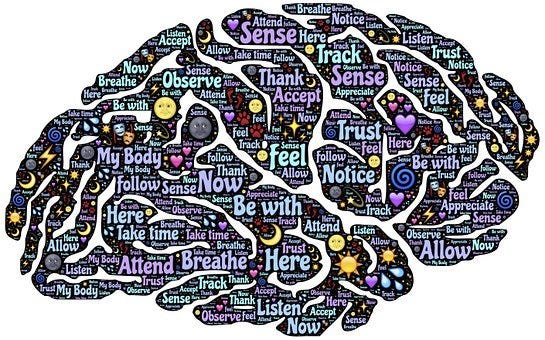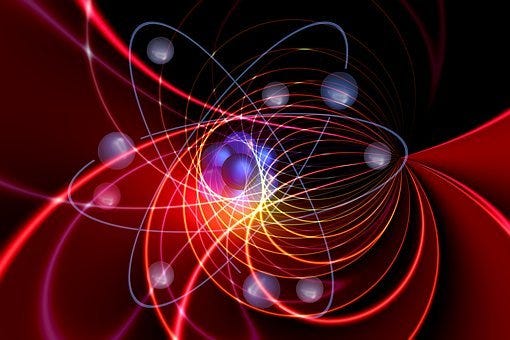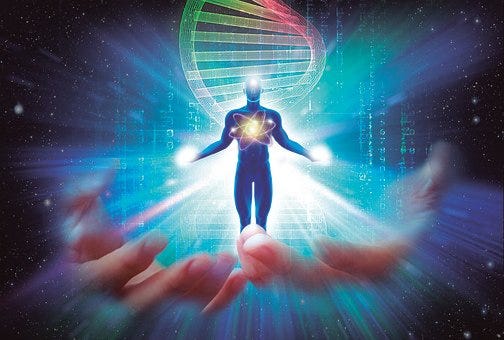
This article follows on from the Introduction, where I discussed the hard problem of consciousness in relation to Philip Goff’s book Galileo’s Error. During the course of his argument he rejects dualism, the idea that consciousness is of a fundamentally different nature from matter. He seems to think that the concept of an immaterial mind is ‘magical’, i.e. non-scientific, and therefore rejects it on a priori grounds. It’s worth considering whether his arguments for doing so are reasonable. Dualism will therefore be the subject of this article.
Before getting round to discussing Goff further, there’s an important clarification to be made. Consider the following two statements:
- a neuroscientist says “the self is an illusion”.
- spiritually oriented people, especially Buddhists, say “the self is an illusion”.
Are we to conclude therefore that Buddhists agree with the neuroscientist? One might assume this, but actually no. Those neuroscientists who believe that the self is an illusion do so because they think that everything related to consciousness is merely a consequence of brain activity. Since these are physical mechanisms, there can therefore be no ghost in the machine. The spiritual person believes, on the contrary, that consciousness and subjective experiences are real and of a different nature to matter, in fact more real than matter, but that they are ultimately of the same nature, because both are manifestations of spirit, albeit at different levels. It is therefore this apparent difference that is considered an illusion, and there is a ghost in the machine. In this article and what follows I shall be arguing for this spiritual understanding of (apparent) dualism. (The philosophical term for this is monistic idealism.)
With this in mind, let’s consider Goff’s reasons for rejecting dualism:
- neuroscientists, he says, can find no evidence of the influence of an immaterial mind on the body in their experiments, which would be hard to believe if there were such an influence.
- the problem of understanding how the mind and body interact, if they are indeed separate.
I found the first argument somewhat strange, because I would say that we know for certain that the mind and brain do interact (although I would prefer the term consciousness, rather than mind). Here is a simple example. I hold out my hand in front of me, and say “I’m going to raise my thumb”. I then raise my thumb. That would seem to be a clear demonstration of mind/brain interaction. So, in theory, all we have to do is ask a neuroscientist to discover what was going on in the brain at the moment I announced my intention, and that would be the evidence required for the interaction. If nothing happened in the brain at that moment, then that would be evidence that the mind and brain are indeed separate, therefore evidence for dualism.
Why does Goff think that this is not evidence of interaction? He discusses the example of bodily movement that I just gave, and here we find a confusing sentence: “Imagine an immaterial mind were impacting on the brain every second of waking life, by initiating physical processes that caused limbs to move in accordance with the wishes of the conscious mind” (p38). This is no longer dualism, because now three separate entities are involved — the brain, the conscious mind, and an immaterial mind. No wonder he has such problems with dualism, if this is how he conceives the required set-up. No wonder he thinks that neuroscientists can find no evidence for the interactions. All he has done, to avoid the problem of dualism, is to assert that brain and mind are, or must be, a single integrated unit. He is merely stating as a fact the point that he is trying to prove. This is therefore some kind of logical vicious circle, and therefore not a convincing argument against dualism.
It is what Goff calls the conscious mind, our sense of personal identity, that is the proper subject for the debate about dualism. The real question is whether or not this is immaterial, and distinct from the body. After all, that was the issue for René Descartes, historically the most famous advocate of dualism. By his statement “I think therefore I am”, he means that the existence of his consciousness is the only thing that he can be absolutely sure about. Here, in this quote from his Meditations, he puts the dualist case even more strongly: “I rightly conclude that my essence consists in this alone, that I am a thinking thing… And although perhaps… I have a body with which I am closely conjoined, I have, on the one hand, a clear and distinct idea of myself as a thinking, non-extended thing, and, on the other hand, a distinct idea of my body as an extended, non-thinking thing; it is therefore certain that I am truly distinct from my body, and can exist without it”. So Descartes does believe that his mind is immaterial, but he is clearly talking about his conscious mind, not Goff’s additional ghostly immaterial mind.
This is how Goff arrived at his position. He believes that Galileo made an error by committing us “to a theory of nature which entailed that consciousness was essentially and inevitably mysterious”. This ensured that consciousness “will be forever locked out of the arena of scientific understanding” (p21). Since he perceives this to be an error, he considers three possible corrections, the first of which is naturalistic dualism which “denies that the conscious mind is something magical or mysterious, instead taking it to be part of the natural order”, and “wants to expand science in such a way as to include nonphysical minds”. The second is materialism, which requires no further explanation. The third is panpsychism, Goff’s version of which I discussed in the introduction, where I concluded that it is really only a watered down version of scientific materialism. He concedes this when he says that materialism has an element of truth in it, which is accounted for in his panpsychism. In similar vein he says that “to solve the problem (of Galileo’s error), we must somehow find a way of making consciousness, once again, the business of science” (p23).
So an important question would be, did Galileo actually make the error that Goff claims? Can a true understanding of consciousness be the business of science, in the sense he intends? Or is it actually mysterious? These questions will be addressed in the next article in the series.
The same observations can be made about Goff’s second problem with dualism — understanding how the mind and body interact, if they are indeed separate. He says that we have zero grasp of this (p28), and that it would be tantamount to a “little miracle”, a divine intervention into the material world (p38). On these grounds also, he rejects dualism. So, what I’ve said in relation to the first objection is again relevant here; he is aiming at the wrong target, and the real question is whether the conscious mind is immaterial, and distinct from the body. (That is an unfashionable viewpoint in modern times, but fashions can change.) Furthermore, we can make an analogy with a computer. People have no problem accepting that the software and hardware of a computer, although of a different nature, are superimposed, and act as one. Why is it so hard therefore to accept that a mind and a brain, of different natures, might also be so closely integrated?

If we are going to make consciousness the business of science again, we may have to turn to quantum physics. Goff does discuss this in a section entitled ‘Quantum Mechanics to the Rescue?’ He agrees, as so many physicists have said, that it is highly successful as a theory because of the accuracy of its predictions. His discussion of it, however, does not take us very far on the issue being discussed here; as he correctly notes, “nobody really knows what quantum mechanics is telling us about reality” (p40). This is confirmed by the physicist Fred Alan Wolf who says “we only know that there is something other than space-time. But we don’t know what it is!”¹. That does not mean, however, that we cannot speculate, make intelligent guesses. That is what he does as he continues: “… because Beyond-Space-Time is non physical, unmeasurable… But what is beyond space-time is within everything. Can it connect with us and influence us within space-time? Is it pure consciousness?” I would say that his speculations are accurate or, at the very least, are consistent with the spiritual world-view (monistic idealism) I outlined at the beginning of the article. Here we have a clear statement that the immaterial (non-physical) interacts with the ‘material’ (although we have to remember that quantum physicists frequently say that there is no such thing as matter).
One physicist who has dedicated herself to the task of understanding how quantum ideas help us understand consciousness is Danah Zohar. Her book The Quantum Self ² offers important insights into these questions. Here she outlines the problem: “However much our modern reason might wish to shake off the mind/body or soul/body dichotomy, this deep cultural conditioning holds us in its grip, not least because the physics of the last 300 years supports it. Ever since Descartes brought dualism to its most succinct and forceful expression in the seventeenth century… subsequent philosophers have tried in vain to argue any viable alternative. Ordinary people have had the same problem. Given our everyday essentially Newtonian, notion of what matter is, and hence what bodies must be, there is no clear way to see how they could be anything like minds” (p75).
We might include Goff in that number of philosophers trying in vain. Even he concedes that “dualism does solve a lot of problems” (p27):
- materialism has so far failed to explain consciousness in terms of the electrochemical processes of the brain.
- it is “a very natural way to think about ourselves”.
- “even some of the most vigorous opponents of dualism concede that in ordinary life they cannot help thinking of their minds as distinct from their bodies”.
The second and third points echo Zohar. It is reasonable to say, therefore, that we humans have a strong intuition that our nature is dual. As Goff points out, of course that doesn’t mean that it’s true. It’s just that science and philosophy have failed to come up with any credible alternative. Goff says that “it is important to emphasize that what we are considering is a deeply nondualistic form of panpsychism” (p135). He is conceding that other forms are possible, and I would argue that we need a deeper version, beyond Goff’s limited one. As he correctly says, consciousness is a ubiquitous feature of matter, but this is true because matter is actually a form of consciousness, not because consciousness is a fundamental attribute of matter. As noted above, this viewpoint is called idealism, which I submit is therefore a more appropriate term than panpsychism. Goff comes close to saying this: “the simplest hypothesis concerning the intrinsic nature of matter outside of brains is that it is continuous with the intrinsic nature of matter inside of brains (both his italics), in the sense that both inside and outside of brains matter has an intrinsic nature made up of forms of consciousness” (my italics). However, as he continues, he then backtracks: “To deny panpsychism one would need a reason for supposing that matter has two kinds of intrinsic nature rather than one” (p134). Precisely! That is why we need this deeper (dualistic) form of panpsychism — idealism.
That brings me back to Danah Zohar, who says precisely that: “The quantum world-view transcends the dichotomy between mind and body, or between inner and outer, by showing us that the basic building blocks of mind (bosons) and the basic building blocks of matter (fernions) arise out of a common, quantum substrate (the vacuum) and are engaged in a mutually creative dialogue whose roots can be traced back to the very heart of reality creation” (p219).
This sounds very much like the quote from Wolf above. Zohar herself considers that she, like Goff, is offering merely a limited version of panpsychism. However, what she calls a full blown version, and therefore rejects, sounds more like animism. This quote shows that, unlike Goff, her panpsychism is dualistic, and is fully in tune with the spiritual (apparent) dualism I described at the start of the article. She is thus asserting that quantum physics is fully in accord with dualistic panpsychism. So perhaps she is fulfilling Goff’s wish that consciousness should once again become the business of science. It nevertheless remains very mysterious!
In the next article I’ll explore a spiritual understanding of consciousness.

Footnotes:
1. Space-time and Beyond, Bantam, 1983, p56
2. Flamingo, 1991
